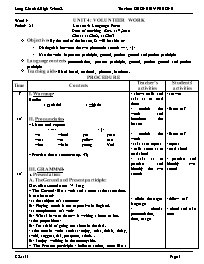Thiết kế bài dạy môn Tiếng Anh 11 - Period: 25 - Unit 4: Volunteer work - Lesson 5: Language focus

Objectives: By the end of the lesson, Ss will be able to:
- Distinguish between the two phonemic sounds /w /, / j /
- Use the verbs in present participle, gerund, perfect gerund and perfect participle
Language contents: pronunciation, present participle, gerund, perfect gerund and perfect participle
Teaching aids : Black board, textbook, pictures, handouts.
Bạn đang xem tài liệu "Thiết kế bài dạy môn Tiếng Anh 11 - Period: 25 - Unit 4: Volunteer work - Lesson 5: Language focus", để tải tài liệu gốc về máy bạn click vào nút DOWNLOAD ở trên
Week 9 UNIT 4: VOLUNTEER WORK Period: 25 Lesson 5: Language Focus Date of teaching :Oct. 11th,2010 Class: 11Cbo2, 11Cbo3 Objectives: By the end of the lesson, Ss will be able to: Distinguish between the two phonemic sounds /w /, / j / Use the verbs in present participle, gerund, perfect gerund and perfect participle Language contents: pronunciation, present participle, gerund, perfect gerund and perfect participle Teaching aids : Black board, textbook, pictures, handouts. PROCEDURE Time Contents Teacher’s activities Students' activities 5’ 10’ 10’ 7’ 7’ 5’ 1’ I. Warm up : Realia: a yardstick a whistle II. Pronunciation: * Listen and repeat: / w / / j / we wheel yes years west wet yellow use wine whale young York * Practise these sentences:(p. 53) III. GRAMMAR: 1. Presentation: A. The Gerund and Present participle: Have the same form : V + ing * The Gerund: like a verb and a noun at the same time. It can be used: - as the subject of a sentence: Ex: Playing tennis is not expensive in England. - as complement of a verb: Ex: What I have to do now is writing a letter to her. - after prepositions: Ex: I’m afraid of going out alone in the dark. - after certain verbs such as: enjoy, miss, finish, delay, avoid, suggest, risk, postpone, admit Ex: I enjoy walking in the countryside. * The Present participle: indicate action, more like a verb or an adjective. It can be used: - as a verb in the continuous tense form: Ex: She is playing tennis. - as an adjective: Ex: It’s a worrying problem. - to replace a relative clause: Ex: The girl (who is) standing over there is Alice. - to replace subject + verb in the main or subordinate clauses: Ex: Entering the room, I saw him. - after the verbs “catch/find/leave + SO Ex: I caught him stealing my bike. - after some verbs suc as: wast/spend/go/be busy Ex: I often go fishing in my free time. B. Perfect Gerund and Perfect Participle: * Perfect Gerund: is the perfect form of the gerund. It is used to refer to a past action. Ex: He admitted having stolen my bike. * Present participle: is the perfect form of the present participle. It is used when one action happens before another action. Ex: Having finished her work, she went home. 2. Practice: Exercise 1: (p.54) Answer key: 1. listening 2. bending 3. behaving 4. meeting 5. spending 6. waiting 7. starting Exercise 2: (p. 54) Answer key: 1. burning, rising 2. reading 3. lying 4. shopping 5. preparing 6. trying 7. modernizing Exercise 3: (p.31) Answer key: 1. having made 2. having been 3. having been 4. having tied 5. Having read 6. having taken V. Homework : - Finish the exercise at home. - Prepare the next lesson (Reading-p.56) - shows realia and asks ss to read them - models the words and introduce the lesson - models the words - asks ss to repeat - calls some ss to read aloud - asks ss to practise and identify the two sounds - elicits the target language - checks pronunciation, form, usage - Runs through - asks ss to do the exercise - Asks ss to give the answer - Gives feedback - Runs through - asks ss to do the exercise - Asks ss to give the answer - Gives feedback - Runs through - asks ss to do the exercise - Asks ss to give the answer - Gives feedback - asks . - answer - listen to T - listen to T - repeat - read aloud - practise and identify two sound - follow to T - check and take note - listen to T - do the exercise - give the answer - Listen To T - listen to T - do the exercise - give the answer - Listen To T - listen to T - do the exercise - give the answer - Listen To T - listen
Tài liệu đính kèm:
 UNIT4-LANGUAGE FOCUS-LOP 11.doc
UNIT4-LANGUAGE FOCUS-LOP 11.doc





